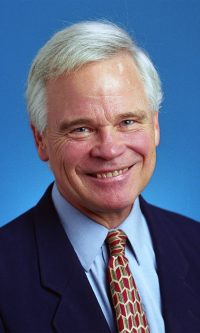DG MARTIN COLUMN: Losing great poets
Fred Chappell, former North Carolina Poet Laureate and longtime professor at the University of North Carolina at Greensboro. died on Jan. 4 at age 87.

D.G. Martin
To celebrate his contributions, I have revised a column I wrote in 2009 about his book of short stories, “Ancestors and Others: New and Selected Stories.”
Asserting that his novels and short stories were equally as great as his poetry could get you in trouble with Chappell’s adoring poetry fans. They will think of him always as North Carolina’s Poet Laureate, even though his term ended in 2003.
Chappell was one of the rare poets whose excellence is celebrated both by his fellow poets and a significant public following.
There is no denying that he was a great poet.
But when he turned his poetry-tuned word-smithing to his inventive, imaginative, and place-based stories, something even better than his poetry was the result, as demonstrated in his 2009 book, “Ancestors and Others: New and Selected Stories.”
That book collected a variety of 21 stories. “Variety” is an insufficient description of the different experiences that Chappell gives his readers, taking them from the North Carolina mountains of the recent past to Sweden, France and England centuries ago; from North Carolina’s “good old boys” to the composer Haydn; from Newton’s theories to how to kill a deer.
After reading each story, I wanted to call some friend to say, “Fred Chappell wrote a short story especially for you.”
I want my hunting friends Doug Lay and Wendell Merritt to read “Tradition,” which takes its hero from his group into a deer blind so cold, as described by Chappell, that this reader started to shake.
For Peter White, former director of the North Carolina Botanical
Garden, “Linnaeus Forgets” is perfect. Chappell takes us to Sweden in 1758 where Carl Linnaeus, the designer of plant classification systems, discovers a plant that houses a community of thousands of tiny human-like creatures.
My former minister, Bob Dunham, could read the short story, “Judas,” and maybe explain Judas’s comment thatJesus was “simply goofy, a nut…. That was the whole trouble, you know. His kind of Madness is contagious.”
Retired music UNC Chapel Hill professor Tom Warburton and former New York Philharmonic lead oboist Joe Robinson would delight in “Moments of Light,” in which Haydn’s visit to Herschel’s (the discoverer of Uranus and also an oboist) observatory led to the composition of “The Creation.”
The despair that follows the loss of a best friend in a deadly accident as described in “Duet” would be familiar to a psychiatrist like the late Dr. Robert Bashford, who would have understood the power of the friend’s music at graveside to give comfort and relief.
The appearance of three genetically reconstructed Civil War soldiers in “Ancestors” would thoroughly entertain Civil War enthusiast Alan Stephenson.
The North Carolina Collection’s former director Bob Anthony could identify with the librarian in “The Lodger.” A dead poet tries to infiltrate and take over the librarian’s life.
Cliff Butler, a retired pharmacist who grew up in Dunn, could follow the country furniture store delivery team hauling a new freezer, the surprise “Christmas Gift” for a farmer’s wife, who had ironed tobacco leaves to get high bids of the buyers for her husband’s crop.
It was easy to tag Chappell’s stories as aimed at prospective men
readers. But Chappell appeals to women, too, especially those who want to understand men and their crazy doings and firm friendships. Some stories are aimed right at women, as in “Gift of Roses,” the poignant tale of a blind woman who rescues heritage roses. Greensboro’s Margaret Arbuckle, who once tried to save an ancient rose bush from the advancing waters of Lake Norman, might also understand.
A few weeks before Chappell’s death, my family also lost a great poet and chronicler of mountain life, my brother, Mike Martin, who also died at age 87. While I will miss both of them, I will always be grateful for their opening doors for me to see the world in richer and deeper ways.
D.G. Martin, a retired lawyer, served as UNC-System’s vice president for public affairs and hosted PBS-NC’s “North Carolina Bookwatch.”

